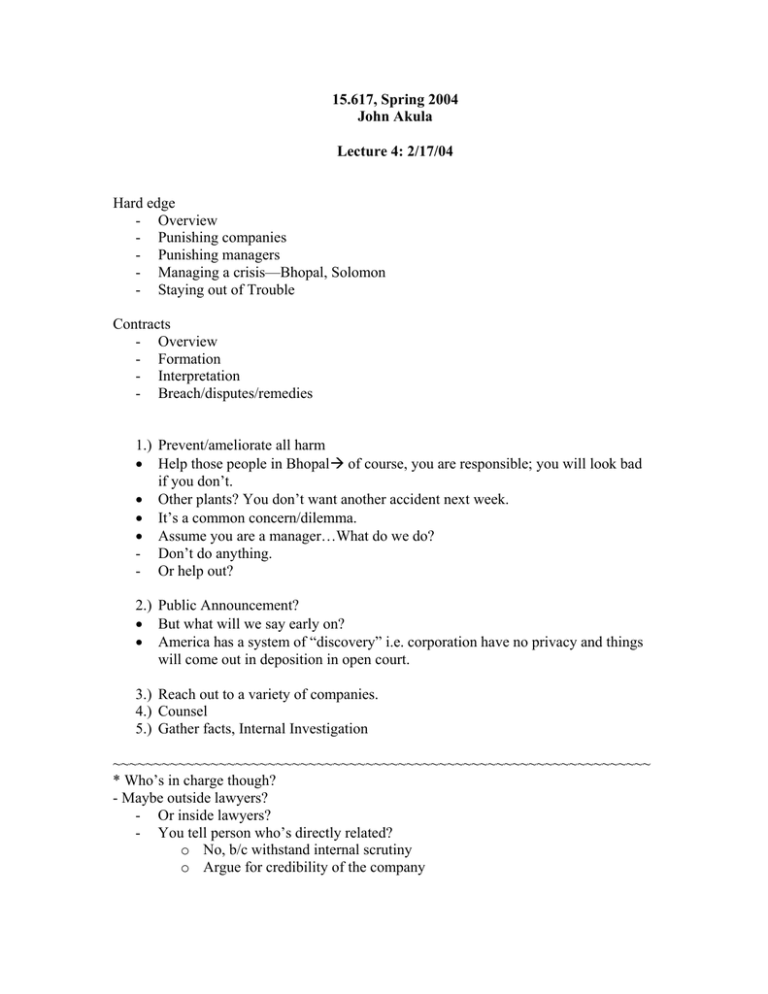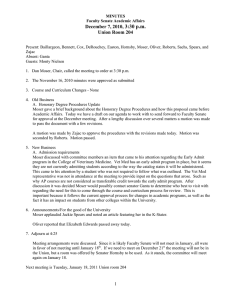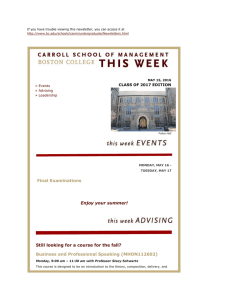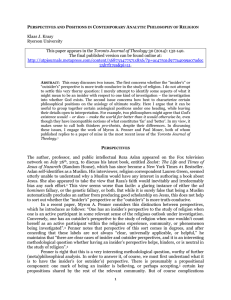15.617, Spring 2004 John Akula Lecture 4: 2/17/04 Hard edge
advertisement

15.617, Spring 2004 John Akula Lecture 4: 2/17/04 Hard edge - Overview - Punishing companies - Punishing managers - Managing a crisis—Bhopal, Solomon - Staying out of Trouble Contracts - Overview - Formation - Interpretation - Breach/disputes/remedies 1.) Prevent/ameliorate all harm • Help those people in BhopalÆ of course, you are responsible; you will look bad if you don’t. • Other plants? You don’t want another accident next week. • It’s a common concern/dilemma. • Assume you are a manager…What do we do? - Don’t do anything. - Or help out? 2.) Public Announcement? • But what will we say early on? • America has a system of “discovery” i.e. corporation have no privacy and things will come out in deposition in open court. 3.) Reach out to a variety of companies. 4.) Counsel 5.) Gather facts, Internal Investigation ~~~~~~~~~~~~~~~~~~~~~~~~~~~~~~~~~~~~~~~~~~~~~~~~~~~~~~~~~~~~~~~~~~ * Who’s in charge though? - Maybe outside lawyers? - Or inside lawyers? - You tell person who’s directly related? o No, b/c withstand internal scrutiny o Argue for credibility of the company o Has to be someone who is completely divorced, operationally from all the decisions that were made. o Give me him a budget. Select a team. Hopefully, you had a crisis plan already. Solomon Brothers (SB): • • • • • • • • Supervisor: Meriwether Road Trader: Moser Special trade in firm Arbitrage group Trying to buy government securities of more than 35% He submits false bids in the clients’ names Moser Æ Meriwether Æ Boss Æ CEO MeriwetherÆ BossÆ CEO is to the top inside council. They try to figure out what to do. Should they report to the authority? They don’t do anything. 1.) How does it break open? * Concerns about auctions for Treasury bonds. • Concerns on part of regulators. • They try to call in the top bankers • CEO does internal investigation (hire an outside law firm) to appeal regulators • Lawyers ask compliance problems • CEO calls a press conference. “We are horrified to discover that there is misconduct. We will get rid of clerks that covered it up.” • BUT: Why didn’t they say anything earlier? He spoke after 2 months. • He was sitting on top of unequivocal, clear knowledge. • This gets referred to U.S. Attorney who is inclined to indict. • But problem is: if a firm has been convicted in a crime regulation government security, they cannot participate. I.e. GONE, (won’t survive indictment). • Board of Directors of SB - Get rid of everyone who was involved - Make public statement that you are going to revamp - Grovel (turn themselves inside out) - Programs of compliance - Waive turning-client privately - Squeaky-clean team • Internal investigation: Moser did it again a couple of times. Perhaps he had tacit permission. • Investigation turns out clean except for Moser. • Adequate supervision. • Nobody goes to jail. They are just forced to retire. • How could this have been better? - Inside council has problem when it comes to compliance “boss pushing boss” But if they had called outside law firm, this wouldn’t have happened. • • - No such thing as a quiet withdrawal. What should the CEO have done to Moser? Put him under supervision? Demote him? Disclose? o 1st: fix it internally o 2nd: Hit the bad people o 3rd: Tidy things up o 4th: reevaluate situation o 5th: Then go to regulators. And explain to them what you’ve’ done and ensure that it won’t ever happen again. Outside council gives you leverage. Staying Out of Trouble: 1.) Company you keep is key: • Stay away form ethically-challenged people. • People who enforce white collar crime have harder times. It’s opaque. So you end up processing minor and major stuff. • Consultants (people come to you when they are in trouble) • Tell clients in the beginning: o Make an assessment early on (set clear expectations) o No cover-ups o 100% compliant 2.) • • • • Don’t do anything stupid. (ex. Arthur Anderson shredding documents) give us full disclosure if you’ve lied to us, we will send you to jail policy holds 99/100 times tell the truth (if you lie, you will get caught) Evaluate your instincts Contracts: (law of the Deal) * Freedom of contract: you agree then law enforces it. Ex. Marriage: “I do” (law then tells you what you have to do) Ex. Doctor-patient HOW DO YOU GET A CONTRACT? 1.) Agreement “Meeting of the minds” 2.) Consideration: “You scratch my back, and I’ll scratch yours”, “reciprocity”, courts don’t’ like bosses who overreach. 3.) Legal capacity. 2 parties should have the capacity to enter the contract. 4.) Formalities (i.e. written, handshake—evidence that there was a contract.) 5.) Intent to be bound (3 hours walk w/ friend example)




